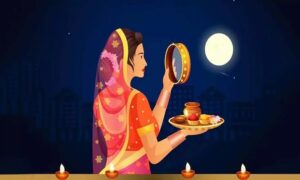Karva Chauth is made of two words, Karva means an earthen oil lamp and Chauth means four. The day of Karva Chauth is celebrated close to Diwali, exactly falls on the fourth day of the month of Kartik. The Kartik month celebrates the harvest time, where it is a time for meeting people and celebration. The Karva Chauth is a celebration of the beautiful bond between a husband and wife celebrating love and togetherness. Today Karva Chauth has become an occasion rather than a prayer.

Karwa Chauth is a significant day in the lives of Hindu women. On this day married women observe a day’s fast and pray for the longevity of their husband’s life. Adding to the spirit of festival are decorated markets, where women enjoy their shopping spree.
It has received a more religious undertone because of the various items that are offered to the Goddess Parvati and a didactic story that is narrated by an elderly woman before the fast is over.
On this day, married women dress up in new clothes (preferably red which signifies a happy married life) and apply mehendi on their hands as a part of the festivities. Women observing this fast get together on this day and celebrate it by narrating folk tale, reading Karwa Chauth Vrat Katha and singing folk songs– all of which make it a lively festival. Women also worship Goddess Parvati in the Karwa Chauth puja followed by Lord Shiva, Lord Ganesh and Lord Kartikeya. The fast is later broken after having a glimpse of the moon.
Rituals:
The fast starts from the dawn, where women eat “sargi” a meal prepared by her mother in law in the morning. After eating the Sargi, women stay without consuming water and food all day long until the moon rises. The mornings are usually indulged in community gatherings, putting henna on hand, etc. In the evening, there is a prayer that is offered by all the women for the long life and well-being of their husbands. The fast is called off once the moon appears. The women observe the moon through a strainer and then the husband is seen through the same strainer. The husband gives water and sweets to the wife opening her fast.
Why do We Celebrate Karwa Chauth?
Given the aforementioned Karva Chauth Katha, you would now be well-versed with the fact why the festival holds utmost importance in the Hindu culture. The prominence of this festival can be widely observed in the North and North Western regions of our country. A massive chunk of the male population of these regions were the soldiers of the Indian Army and officials of the Military Forces and for the safety of these people, women of these regions started fasting. These armed forces, policemen, soldiers, and military personnel protected the country from enemies and the women used to pray to God for the longevity of their men. The time of this festival coincides with the initiation of the Rabi cropping season which is the wheat sowing season in these aforementioned areas. The women of the families fill the earthen pot or Karwa with wheat grains and offer them to God praying for a great Rabi season.
In ancient India, women of 10-13 years of age were married. Hardly they could enjoy their childhood or early teenage in such a marriage. Communication was also a big obstacle in those days. So, they couldn’t come to their parent’s homes easily and it was also not considered good. So, from an early age, a woman had to take full responsibility for a new household. From cooking to cleaning, she was the in-charge. But, she was all alone away from her loved ones in an unknown house and without any friends too. Where would she go while feeling alone or missing home? So, to resolve this problem, the women started celebrating Karwa Chauth in a grand way where married women of the whole village and some nearby villages used to congregate in one place and spend the day in joy and laughter. They befriended each other and called each other God-friends or God-sisters. One can say that this festival started as a means of enjoyment and to forget the fact that they are alone at their in-laws’ place. They celebrated the union among themselves on this day and gifted each other bangles, lipsticks, sindoor, etc. to remind each other that there is always a friend somewhere.
In recent times, husbands have also started observing fasts for their wives. The gesture has made the festival extra-special as it signifies love, understanding and compassion from both ends.
